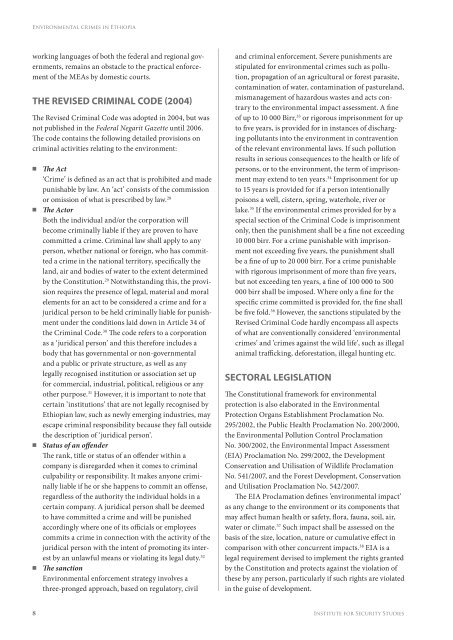4466 Environmental Crimes in Ethiopia.indd
4466 Environmental Crimes in Ethiopia.indd
4466 Environmental Crimes in Ethiopia.indd
You also want an ePaper? Increase the reach of your titles
YUMPU automatically turns print PDFs into web optimized ePapers that Google loves.
<strong>Environmental</strong> crimes <strong>in</strong> <strong>Ethiopia</strong><br />
work<strong>in</strong>g languages of both the federal and regional governments,<br />
rema<strong>in</strong>s an obstacle to the practical enforcement<br />
of the MEAs by domestic courts.<br />
THE REVISED CRIMINAL CODE (2004)<br />
The Revised Crim<strong>in</strong>al Code was adopted <strong>in</strong> 2004, but was<br />
not published <strong>in</strong> the Federal Negarit Gazette until 2006.<br />
The code conta<strong>in</strong>s the follow<strong>in</strong>g detailed provisions on<br />
crim<strong>in</strong>al activities relat<strong>in</strong>g to the environment:<br />
■<br />
■<br />
■<br />
■<br />
The Act<br />
‘Crime’ is def<strong>in</strong>ed as an act that is prohibited and made<br />
punishable by law. An ‘act’ consists of the commission<br />
or omission of what is prescribed by law. 28<br />
The Actor<br />
Both the <strong>in</strong>dividual and/or the corporation will<br />
become crim<strong>in</strong>ally liable if they are proven to have<br />
committed a crime. Crim<strong>in</strong>al law shall apply to any<br />
person, whether national or foreign, who has committed<br />
a crime <strong>in</strong> the national territory, specifically the<br />
land, air and bodies of water to the extent determ<strong>in</strong>ed<br />
by the Constitution. 29 Notwithstand<strong>in</strong>g this, the provision<br />
requires the presence of legal, material and moral<br />
elements for an act to be considered a crime and for a<br />
juridical person to be held crim<strong>in</strong>ally liable for punishment<br />
under the conditions laid down <strong>in</strong> Article 34 of<br />
the Crim<strong>in</strong>al Code. 30 The code refers to a corporation<br />
as a ‘juridical person’ and this therefore <strong>in</strong>cludes a<br />
body that has governmental or non-governmental<br />
and a public or private structure, as well as any<br />
legally recognised <strong>in</strong>stitution or association set up<br />
for commercial, <strong>in</strong>dustrial, political, religious or any<br />
other purpose. 31 However, it is important to note that<br />
certa<strong>in</strong> ’<strong>in</strong>stitutions’ that are not legally recognised by<br />
<strong>Ethiopia</strong>n law, such as newly emerg<strong>in</strong>g <strong>in</strong>dustries, may<br />
escape crim<strong>in</strong>al responsibility because they fall outside<br />
the description of ‘juridical person’.<br />
Status of an offender<br />
The rank, title or status of an offender with<strong>in</strong> a<br />
company is disregarded when it comes to crim<strong>in</strong>al<br />
culpability or responsibility. It makes anyone crim<strong>in</strong>ally<br />
liable if he or she happens to commit an offense,<br />
regardless of the authority the <strong>in</strong>dividual holds <strong>in</strong> a<br />
certa<strong>in</strong> company. A juridical person shall be deemed<br />
to have committed a crime and will be punished<br />
accord<strong>in</strong>gly where one of its officials or employees<br />
commits a crime <strong>in</strong> connection with the activity of the<br />
juridical person with the <strong>in</strong>tent of promot<strong>in</strong>g its <strong>in</strong>terest<br />
by an unlawful means or violat<strong>in</strong>g its legal duty. 32<br />
The sanction<br />
<strong>Environmental</strong> enforcement strategy <strong>in</strong>volves a<br />
three-pronged approach, based on regulatory, civil<br />
and crim<strong>in</strong>al enforcement. Severe punishments are<br />
stipulated for environmental crimes such as pollution,<br />
propagation of an agricultural or forest parasite,<br />
contam<strong>in</strong>ation of water, contam<strong>in</strong>ation of pastureland,<br />
mismanagement of hazardous wastes and acts contrary<br />
to the environmental impact assessment. A f<strong>in</strong>e<br />
of up to 10 000 Birr, 33 or rigorous imprisonment for up<br />
to five years, is provided for <strong>in</strong> <strong>in</strong>stances of discharg<strong>in</strong>g<br />
pollutants <strong>in</strong>to the environment <strong>in</strong> contravention<br />
of the relevant environmental laws. If such pollution<br />
results <strong>in</strong> serious consequences to the health or life of<br />
persons, or to the environment, the term of imprisonment<br />
may extend to ten years. 34 Imprisonment for up<br />
to 15 years is provided for if a person <strong>in</strong>tentionally<br />
poisons a well, cistern, spr<strong>in</strong>g, waterhole, river or<br />
lake. 35 If the environmental crimes provided for by a<br />
special section of the Crim<strong>in</strong>al Code is imprisonment<br />
only, then the punishment shall be a f<strong>in</strong>e not exceed<strong>in</strong>g<br />
10 000 birr. For a crime punishable with imprisonment<br />
not exceed<strong>in</strong>g five years, the punishment shall<br />
be a f<strong>in</strong>e of up to 20 000 birr. For a crime punishable<br />
with rigorous imprisonment of more than five years,<br />
but not exceed<strong>in</strong>g ten years, a f<strong>in</strong>e of 100 000 to 500<br />
000 birr shall be imposed. Where only a f<strong>in</strong>e for the<br />
specific crime committed is provided for, the f<strong>in</strong>e shall<br />
be five fold. 36 However, the sanctions stipulated by the<br />
Revised Crim<strong>in</strong>al Code hardly encompass all aspects<br />
of what are conventionally considered ‘environmental<br />
crimes’ and ’crimes aga<strong>in</strong>st the wild life’, such as illegal<br />
animal traffick<strong>in</strong>g, deforestation, illegal hunt<strong>in</strong>g etc.<br />
SECTORAL LEGISLATION<br />
The Constitutional framework for environmental<br />
protection is also elaborated <strong>in</strong> the <strong>Environmental</strong><br />
Protection Organs Establishment Proclamation No.<br />
295/2002, the Public Health Proclamation No. 200/2000,<br />
the <strong>Environmental</strong> Pollution Control Proclamation<br />
No. 300/2002, the <strong>Environmental</strong> Impact Assessment<br />
(EIA) Proclamation No. 299/2002, the Development<br />
Conservation and Utilisation of Wildlife Proclamation<br />
No. 541/2007, and the Forest Development, Conservation<br />
and Utilisation Proclamation No. 542/2007.<br />
The EIA Proclamation def<strong>in</strong>es ’environmental impact’<br />
as any change to the environment or its components that<br />
may affect human health or safety, flora, fauna, soil, air,<br />
water or climate. 37 Such impact shall be assessed on the<br />
basis of the size, location, nature or cumulative effect <strong>in</strong><br />
comparison with other concurrent impacts. 38 EIA is a<br />
legal requirement devised to implement the rights granted<br />
by the Constitution and protects aga<strong>in</strong>st the violation of<br />
these by any person, particularly if such rights are violated<br />
<strong>in</strong> the guise of development.<br />
8 Institute for Security Studies
















